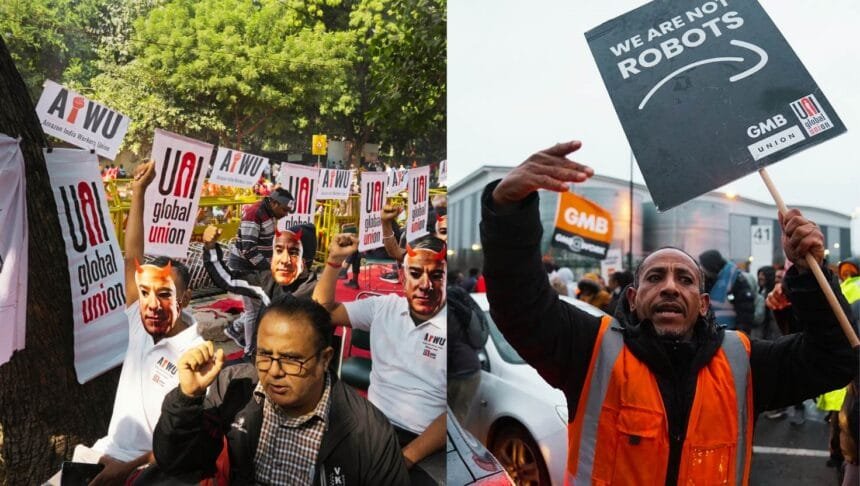As the holiday shopping season ramps up, Amazon workers worldwide are taking a bold stand against what they describe as systemic labor abuses, environmental neglect, and threats to democracy.
This year marks the fifth annual “Make Amazon Pay” campaign, organized by UNI Global Union and Progressive International.
The protests, spanning from Black Friday to Cyber Monday, aim to disrupt one of Amazon’s most profitable periods, shedding light on the growing discontent among its workforce.
A Global Movement for Change
The planned strikes and demonstrations will see participation from thousands of Amazon workers and their allies across more than 20 countries, including the United States, Germany, France, the United Kingdom, and India.
The campaign has garnered the support of over 80 trade unions, anti-poverty organizations, and advocacy groups, emphasizing a unified demand for fair treatment of Amazon employees.
Christy Hoffman, General Secretary of UNI Global Union, highlighted the movement’s significance:
“From India to the United States, the U.K. to Canada, workers are rising against exploitation and corporate intimidation. ‘Make Amazon Pay Day’ is a powerful testament to our unity and momentum. No company — no matter how wealthy — can silence the cause of workers demanding justice.”
The strikes target Amazon’s practices, accusing the company of prioritizing profit over the welfare of its workers, communities, and the planet.
Voices of Resistance Across Continents
In Germany, where the union ver.di has long fought for collective bargaining rights, thousands of workers will take to the streets.
Similarly, in New Delhi, India, hundreds of workers plan to rally, citing Amazon’s alleged mistreatment during last summer’s devastating heatwave.
Strikes are also expected in major U.S. cities, though the exact scale of participation remains unclear.
Hoffman underscored the resilience of Amazon’s workforce, stating:
“Jeff Bezos’s company has spent untold millions to stop workers from organizing, but the strikes and protests happening around the world show that workers’ desire for justice — for union representation — can’t be stopped.”
Potential Impact on Holiday Deliveries
For Amazon customers, the timing of these strikes could spell delays in holiday deliveries. Black Friday and Cyber Monday are critical shopping days, driving billions in sales for the e-commerce giant.
Disruptions during this period may pressure Amazon to address workers’ concerns or risk reputational and financial damage.
Amazon, however, remains steadfast in defending its workplace policies. Eileen Hards, an Amazon spokesperson, responded to the campaign by labeling the organizers’ claims as “intentionally misleading” and emphasized the company’s commitment to providing competitive pay, benefits, and safe work environments:
“The fact is, at Amazon, we provide great pay, great benefits, and great opportunities — all from day one. We’ve created more than 1.5 million jobs around the world, and counting, and we provide a modern, safe, and engaging workplace.”
A Growing Divide Between Amazon and Its Workforce
The “Make Amazon Pay” movement shines a spotlight on a broader issue: the widening gap between corporate interests and worker rights.
Critics argue that Amazon’s immense profitability has come at the expense of its workforce. Striking workers demand better wages, improved working conditions, and acknowledgment of their right to unionize.
Amazon’s critics also point to environmental concerns and the company’s influence on democracy.
The campaign calls for greater accountability, not just from Amazon but from other global corporations following similar practices.
Divorce Audiences: Lessons in Negotiation and Advocacy
For divorced individuals in the United States, the Amazon strike offers parallels to personal and professional negotiations. The workers’ fight for fairness mirrors the challenges faced during divorce proceedings, where advocating for one’s rights can feel like an uphill battle against larger forces.
Here are key takeaways for divorced audiences:
- Unity in Advocacy: Just as Amazon workers are uniting globally, individuals navigating divorce can benefit from a strong support system, whether it’s family, friends, or legal counsel.
- Strategic Timing: The strike’s alignment with a critical shopping weekend highlights the importance of timing in negotiations. Similarly, strategic planning can yield better outcomes during divorce settlements.
- Resilience in the Face of Opposition: Amazon workers continue to resist corporate pushback, demonstrating the power of persistence. Divorce often requires the same level of resilience when facing challenges.
- Demanding Fairness: Whether it’s workers advocating for fair wages or divorced individuals seeking equitable settlements, standing firm on principles is essential.
The Path Forward
As the strikes unfold, the world will watch to see how Amazon responds to these growing demands.
Will the company address worker grievances, or will it double down on its current practices?
For those navigating personal battles, the Amazon strike serves as a reminder of the power of collective action and the importance of holding firm to one’s values.
The “Make Amazon Pay” campaign is more than a call for labor reform—it’s a testament to the enduring spirit of advocacy.
For divorced individuals, it’s an opportunity to reflect on their own journeys and draw inspiration from a movement that refuses to back down.



